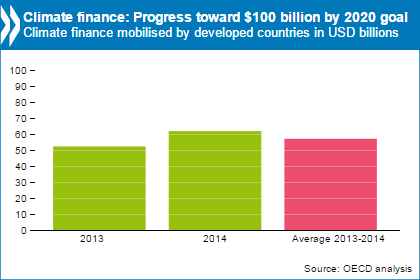
By Theophilus Ikpome
Reactions have continued to trail OECD’s latest report on climate finance released today.
Published on Wednesday, the report, Climate Finance in 2013-14 and the USD 100 billion goal, claims that “significant progress” is being made towards the goal of $100 billion by 2020 as rich countries have provided a total of US$62 billion in 2014 to tackle and adapt to climate change in poor countries, up from US$52 billion in 2013.
With the goal to reach an annual US$100 billion in climate finance by 2020, the findings “paint an encouraging picture of progress,” said OECD Secretary-General Angel Gurría.
In a swift reaction, ActionAid’s Senior Policy Analyst Brandon Wu, a climate finance expert and the developed country NGO representative to the Board of the Green Climate Fund, said “the claims made in the OECD report are misleading. Counting export credits, the full value of loans, and private investments as climate finance does not serve the needs of people affected by climate change. It only serves the needs of rich country governments that are failing to meet their obligations.
“The primary objective of climate finance is to benefit developing countries and support their climate action. Yet the large majority of the OECD’s $60 billion estimate are in the form of export credits, the full value of both concessional and market-rate loans, and private investment. The ultimate beneficiaries of these forms of finance are actors in rich countries – not developing countries, much less poor and vulnerable communities” he said.
“If we really care about climate change and the devastating impacts it’s having on the world’s poorest and most vulnerable people, we need to make sure climate finance gets to the people who need it most. The amounts committed to date fall far short of what’s needed, and accounting tricks won’t change that” Wu added.
“We welcome that OECD governments are saying they still intend to reach the $100 billion goal. But dodgy accounting to make rich countries look good won’t help prevent disaster for poor countries and their people,” Wu concluded.
The OECD report acknowledges that only 16 percent of its own $60 billion figure went to adaptation finance, illustrating a further gap in support for the poorest and most vulnerable as they struggle to cope with increasingly severe climate impacts.












Comments 1